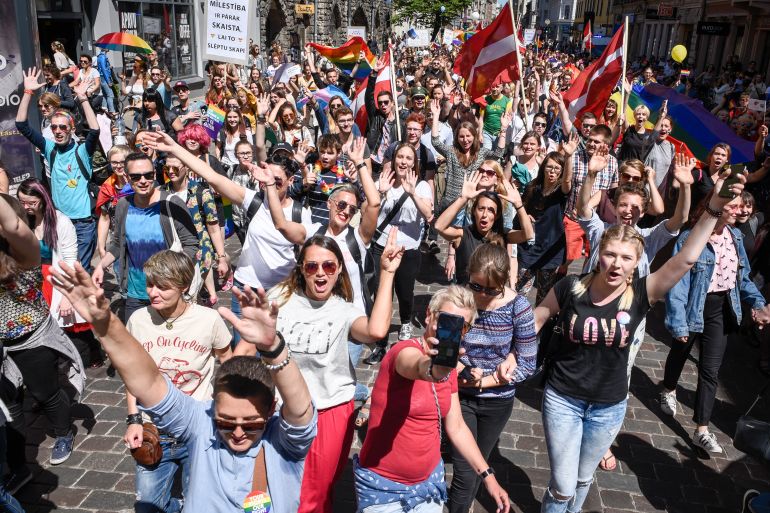Estonia passes law to allow same-sex marriage
Prime Minister Kaja Kallas says she is ‘proud of Estonia’ after the bill received 55 votes in the 101-seat parliament.

Estonia’s Parliament has passed a law to legalise same-sex marriage, making it the first Central European country to do so.
The bill received 55 votes in the 101-seat parliament with 34 votes against.
Keep reading
list of 3 itemsProtests in Italy as government restricts same-sex parent rights
S Korea court landmark ruling recognises same-sex couple’s rights
“This is a decision that does not take anything away from anyone but gives something important to many,” Prime Minister Kaja Kallas said after the vote on Tuesday.
“Everyone should have the right to marry the person they love and want to commit to,” Kallas added, saying she was “proud of Estonia”.
Same-sex marriage is legal in much of Western Europe but not in Central European countries that were once under communist rule and members of the Moscow-led Warsaw Pact alliance but now are members of NATO and, largely, the EU.
Same-sex couples have been able to enter a civil union in Estonia since 2014. But it has taken until now for parliament to fix legal loopholes that prevented same-sex partners from enjoying the same benefits as heterosexual couples.
In the largely secular Baltic country of 1.3 million people, 53 percent of the population supported same-sex marriage in a 2023 poll by the Centre for Human Rights. A decade ago, the number was 34 percent.
However, 38 percent of Estonians still consider homosexuality to be unacceptable. Same-sex marriage is opposed by the ethnic-Russian minority, which constitutes a quarter of the country with only 40 percent of them supporting it.
‘Good opportunity’
Gay people in Estonia tend to remain discreet about their identity, and half have experienced harassment recently, according to the government.
“This was a good opportunity for the government because the public opinion on same-sex marriage has turned to positive, and after this year’s election, it has the numbers to overcome the conservative opposition,” said Tomas Jermalavicius, head of studies at the International Centre for Defence and Security.
Latvia and Lithuania, the other two Baltic countries, which were annexed by the Soviet Union, have same-sex partnership bills stuck in their parliaments.
Annely Lepamaa, a lesbian, told the Reuters news agency that it felt like the state was “finally accepting me”.
“Until now, I needed to fight for everything. I had to go to court to adopt my own children, which is like, why?” the 46-year-old said. “Now, I’m a human with rights.”
Speaking to Reuters after the vote, Lepamaa’s partner of six years, Eeva Koplimets, 36, proposed they should get married.
“Yeah, we are switching [to marriage]. We made our decision on TV!” she said.